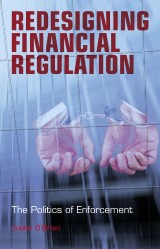Details

Redesigning Financial Regulation
The Politics of Enforcement1. Aufl.
|
45,99 € |
|
| Verlag: | Wiley |
| Format: | |
| Veröffentl.: | 02.11.2006 |
| ISBN/EAN: | 9780470060421 |
| Sprache: | englisch |
| Anzahl Seiten: | 220 |
DRM-geschütztes eBook, Sie benötigen z.B. Adobe Digital Editions und eine Adobe ID zum Lesen.
Beschreibungen
At the height of the 1990s boom, Jack Grubman, one of the most successful analysts in Wall Street proclaimed ‘what used to be conflicts of interest are now synergies’. This myopia contributed dramatically to the elevation of a culture in which greed was deified, oversight denigrated and misfeasance justified. Since the fall of the markets and the implosion of confidence in the American corporate business model, one man has proved instrumental in deconstructing the rhetoric of the 1990s: Eliot Spitzer, the combative Attorney General of New York. In the process, his innovative application of state law has reconfigured the governance of Wall Street. <p>Over the past three years the pursuit of transparency and accountability in the structure of the markets has propelled Spitzer to the forefront of regulatory policy. His investigations into tainted analyst research, the mutual funds industry, the governance of the New York Stock Exchange and the insurance industry have focused attention not just on corrupted individuals but also the complicity of the financial structure itself. Spitzer exploited the inherent conflicts of interest to the full, forcing regulators to adopt a much more proactive approach and creating a national platform for his own wider political ambitions. Now holding the Democratic nomination for the Governorship of New York, Spitzer has begun a path for higher national office.</p> <p>This groundbreaking book features exclusive access with many of the key actors in these changes to the governance of Wall Street. It examines how Eliot Spitzer exploited gaps in the regulatory framework to capture the corporate reform agenda and explores the implications of his actions on policy formation and recalibration.</p> <p>Key incidents include: changing the terms of reference governing analyst research; the defenestration of Dick Grasso’s tenure over the NYSE (which is now being heard in state court in New York); and the battles for control between the former Chairman of the Securities Exchange Commission, Harvey Pitt, and Spitzer.</p> <p>The book details not only the contested, contingent and interdependent connections between the American political and financial systems but reveals how Spitzer’s manipulation of those connections have proved instrumental in enhancing his own wider political ambitions.</p>
Author's note. <p>1 Redesigning financial regulation: the politics of enforcement.</p> <p>2 Taming the corporation? Sarbanes–Oxley and the politics of symbolism.</p> <p>3 Enforcing power: the contested role of Eliot Spitzer.</p> <p>4 The limitations of the criminal process.</p> <p>5 Corporate governance and the institutionalization of compliance.</p> <p>6 The efficacy and pitfalls of pre-trial diversion.</p> <p>7 Global markets, regulatory enforcement and the dynamics of corporate crime.</p> <p>8 Transcending compliance.</p> <p>Index.</p>
<b>Justin O'Brien</b> is Professor of Corporate Governance at the Centre for Applied Philosophy and Public Ethics, based at the Australian National University. He previously ran the corporate governance programme at the School of Law, Queen’s University Belfast. He is the Principal Investigator of <i>Regulatory Regime Change in World Financial Markets</i>, an international research project funded by the Economic and Social Research Council in the United Kingdom. He is the author of <i>Wall Street on Trial</i> and the editor of <i>Governing the Corporation</i>, both published by John Wiley & Sons. Professor O'Brien has also written extensively on political corruption. His current research centres on the ethical dimension of managing conflicts in the financial services industry. He lives in Canberra.
<i>Redesigning Financial Regulation</i> maps the policy response to corporate scandal to adjudicate whether the reforms adopted provide a panacea or merely a psychological placebo. It achieves this by drilling down into the foundations of the wider institutional architecture. It highlights the critical importance of organizational culture, operational discretion and enforcement proclivity in determining the scope and direction of regulatory innovation. <p>The book evaluates how changes to enforcement patterns impact on both the form and function of corporate governance. Can changes to the enforcement firmament be traced to coherent reappraisal? Conversely, do they merely represent crisis management devoid of overarching strategic purpose, with reflexive muscularity driven by largely inchoate public demands for legalistic accountability? Is the retreat to formal legal sanction conditioned by the need to instill confidence in the regulator, the narrow legal framework or wider societal norms? How does one avoid or, at the least, mitigate the risk that application of increased authority will lead, if misapplied, to decreased legitimacy through regulatory overreach? Given the critical importance of the capital markets in the United States to international regulatory policy, this book provides an essential map to ascertain whether, and if so, how, convergence can help instill confidence in the integrity of global markets.</p>


















